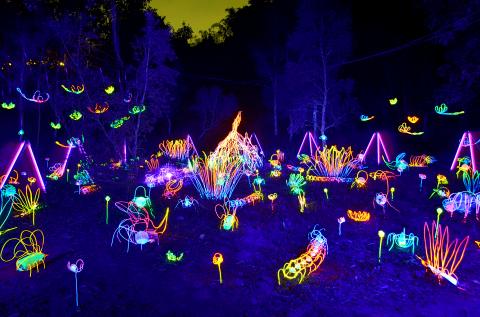The Longci Light Festival attracted 190,000 visitors over its seven-week run, the Tainan City Government said yesterday.
The festival, which ended yesterday, was praised online, with a post on its Facebook page calling it “the most beautiful outdoor light festival nationwide.”
Organizers said that they were surprised by the public’s interest in the festival, which was held for the first time.

Photo: Wu Chun-feng, Taipei Times
The event in the small mountain town of Longci attracted more than 18 times the number of local residents, they added.
The festival, which opened on Dec. 21, was originally scheduled to end on Sunday last week, but the city government extended it by a week to accommodate its unexpected popularity, it said.
Tainan Mayor Huang Wei-che (黃偉哲) encouraged the extension and said that the city would hold the festival again at the end of this year.
Visitors over the past week reached about 50,000 people, the city government said.
Local enterprises, including food vendors and the Longci Farmers’ Association’s bamboo charcoal store and workshop, saw their business improve during the festival, it said.
The event, which cost the special municipality NT$7 million (US$232,357), was aimed at boosting tourism in the region between Longci and Yanshuei (鹽水) townships over the Lunar New Year and Lantern Festival periods, the city said.
To avoid light pollution in the city, organizers held the festival in Husingshan Park in Longci, and invited artists to build installations using aluminum wiring and fluorescent lights.
Separately, a flower festival organized by the Changhua County Government attracted about 860,000 people over 16 days, which was about the same as last year, the county said.
The number was still impressive given the effects of the 2019 novel coronavirus outbreak, which has caused people to avoid crowds, it said.
Visitors to the festival, which also ended yesterday, took in the sight of colorful flower displays during the day and viewed a light festival in the evenings, it added.
A memorial for people who have died in the outbreak was also on display, which proved popular with visitors, the county government said.

Alain Robert, known as the "French Spider-Man," praised Alex Honnold as exceptionally well-prepared after the US climber completed a free solo ascent of Taipei 101 yesterday. Robert said Honnold's ascent of the 508m-tall skyscraper in just more than one-and-a-half hours without using safety ropes or equipment was a remarkable achievement. "This is my life," he said in an interview conducted in French, adding that he liked the feeling of being "on the edge of danger." The 63-year-old Frenchman climbed Taipei 101 using ropes in December 2004, taking about four hours to reach the top. On a one-to-10 scale of difficulty, Robert said Taipei 101

Nipah virus infection is to be officially listed as a category 5 notifiable infectious disease in Taiwan in March, while clinical treatment guidelines are being formulated, the Centers for Disease Control (CDC) said yesterday. With Nipah infections being reported in other countries and considering its relatively high fatality rate, the centers on Jan. 16 announced that it would be listed as a notifiable infectious disease to bolster the nation’s systematic early warning system and increase public awareness, the CDC said. Bangladesh reported four fatal cases last year in separate districts, with three linked to raw date palm sap consumption, CDC Epidemic Intelligence

Two Taiwanese prosecutors were questioned by Chinese security personnel at their hotel during a trip to China’s Henan Province this month, the Mainland Affairs Council (MAC) said yesterday. The officers had personal information on the prosecutors, including “when they were assigned to their posts, their work locations and job titles,” MAC Deputy Minister and spokesman Liang Wen-chieh (梁文傑) said. On top of asking about their agencies and positions, the officers also questioned the prosecutors about the Cross-Strait Joint Crime-Fighting and Judicial Mutual Assistance Agreement, a pact that serves as the framework for Taiwan-China cooperation on combating crime and providing judicial assistance, Liang

US climber Alex Honnold left Taiwan this morning a day after completing a free-solo ascent of Taipei 101, a feat that drew cheers from onlookers and gained widespread international attention. Honnold yesterday scaled the 101-story skyscraper without a rope or safety harness. The climb — the highest urban free-solo ascent ever attempted — took just more than 90 minutes and was streamed live on Netflix. It was covered by major international news outlets including CNN, the New York Times, the Guardian and the Wall Street Journal. As Honnold prepared to leave Taiwan today, he attracted a crowd when he and his wife, Sanni,